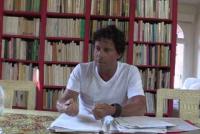-
Austin poised to become first "sanctuary city" in Texas
Austin is set to become the first sanctuary city in Texas. And in a move that would defy not just Republican orthodoxy but also the Obama administration’s policy on deporting criminal immigrants, the county where Austin sits is on the verge of ending cooperation with the federal government on immigration matters.
-
-
A new generation of low-cost, networked, nuclear-radiation detectors
A DARPA program aimed at preventing attacks involving radiological “dirty bombs” and other nuclear threats has successfully developed and demonstrated a network of smartphone-sized mobile devices that can detect the tiniest traces of radioactive materials. Combined with larger detectors along major roadways, bridges, other fixed infrastructure, and in vehicles, the new networked devices promise significantly enhanced awareness of radiation sources and greater advance warning of possible threats.
-
-
North Korea creates specials nuclear backpack units to infiltrate the South
North Korea has established a special infantry unit whose soldiers are being trained for a one-way mission: in the event of war with South Korea, they will infiltrate the South carrying nuclear devices in backpacks and detonate their weapons in the middle of population centers. North Korean military issued calls to the nation’s soldiers to become human “nuclear arsenals” in the event of war in the region. Military analysts said the units are, in effect, suicide squads, resembling the Japanese kamikaze pilots sent to attack Allied warships toward the end of the Second World War.
-
-
Virginia man driven to join ISIS because it gave him a “sense of belonging”: Judge
Seven young men arrested in Virginia for planning to join ISIS have been described in court as struggling to find work or finish school. “ISIS has done a good job projecting that they are not just about violence,” says one expert. “They know that they’re going to appeal to the young person who’s just pissed off and has had a bad deal. But they also want the dreamer, the North American converts who are virtually clueless about Islam but are beguiled by this fantasy that they’ve bought into.” Joseph Farrokh, 29, who in July was sentenced to 8.5 years in prison, wrote the Judge that ultimately he was attracted to the terror group because its propaganda gave him a “sense of belonging.”
-
-
Want to prevent lone wolf terrorism? Promote a “sense of belonging”

Why are we seeing a rash of lone-wolf terrorist attacks in Europe and especially in France, and are measures such as the burkini ban in France effective in countering them? What have we learned from the horrors of the Charlie Hebdo shooting, the murder of 130 people in and around Paris last November, the Bastille Day truck attack in Nice, and the killing of an 85-year-old priest inside of a church in Normandy? How can we hope to prevent future attacks? Security can be heightened, and intelligence efforts can be redoubled, but these measure may not be sufficient. We need to change our focus, to examining these perpetrators’ “sense of belonging” rather than looking for reasons to detain or expel them because they don’t belong.
-
-
GW Program on Extremism expands research, expertise
Since its launch in June 2015, the George Washington University’s Program on Extremism has contributed research and analysis on violent and non-violent extremism. GW notes the program’s report ISIS in America: From Retweets to Raqqa has been used by policymakers and law enforcement as a trusted source. Now in its second year, program leadership says they will continue to grow as a leading resource of expertise and research on extremism by expanding with new initiatives and hires.
-
-
ISIS’s second-in-command killed in Syria
In the most serious blow to ISIS leadership yet, Abu Muhammad al-Adnani, the Islamist group’s second-in-command, was killed by a coalition airstrike. The U.S.-led coalition has been systematically going after ISIS leadership. In the last six months airstrikes killed the organization’s No. 4 — finance minister Haji Iman — and No. 3, the group’s defense minister, Omar al-Shishani.
-
-
FBI director calls for “adult conversation” on encryption – and the privacy-security balance

James Comey, the FBI director, has again said that end-to-end encryption on digital devices makes it impossible for his agency to investigate crimes and acts of terrorism— and called for an “adult conversation” with the manufacturers of these devices. Widespread encryption built into smartphones was “making more and more of the room that we are charged to investigate dark,” Comey said at a cybersecurity symposium.
-
-
Practical guide on how to counter extremists’ narratives in South East Asia
On Tuesday, the Hedayah Institute launched its latest compendium and report titled Undermining Violent Extremist Narratives in South East Asia. The report contains practical advice for civil society organizations and practitioners to develop effective narratives that counter the approaches of ISIS, al-Qaeda, Jemaah Islamiyah, and other violent extremists in the region. The guide also contains clear examples of counter-messages, case studies, and links to videos and Web sites that are relevant to supporting the development of counter-narratives.
-
-
Former senior Obama official: Inaction in Syria result of desire to keep Iran deal alive
The White House’s failure to stop the ongoing slaughter perpetrated by the Syrian regime of Bashar al-Assad stems from President Barack Obama’s “desire to accommodate Iran” so that last year’s nuclear deal will extend past his administration, the president’s former top Syria adviser charged.
-
-
A momentous peace deal with the FARC – so what next for Colombia?

After more than fifty years of armed conflict, and four years of negotiations, the Colombian government and the leftist guerrilla group, the FARC, have reached a final peace agreement. The historic deal looks set to bring to an end the longest running war of recent history. The agreement is cause for huge celebration, but an official end to war with the FARC is only the start of the road to peace. Both ex-guerrillas, and military personnel who may have to leave the armed forces due to budget cuts, will now face the difficulties of a transition into civilian life. Reintegration programs are crucial not only for former combatants but also for those who have served their country for years. Securing peace therefore requires the coordination of all security-related government institutions across ministries, in partnership with the UN, and in line with the protection needs of civilians. This joint effort can boost confidence in tackling both immediate and long-term security challenges, paving the way for the Colombian people to vote “yes” to peace.
-
-
Up to 15,000 ISIS victims buried in 72 mass graves found in Syria, Iraq
The vast areas in Syria and Iraq which came under the control of ISIS in 2014 are dotted with grim reminders of the Islamist group’s brutality. The AP reports that a comprehensive survey by the news agency, using satellite imagery, excavations, mapping, and survivors testimony, has identified seventy-two mass graves in Syria and Iraq – containing up to 15,000 bodies — and that many more such graves will be discovered as the U.S.-led coalition is pushing ISIS back and shrinking the territory under the group’s control.
-
-
Iraqi government-backed militias recruiting children
Iraqi government-backed militias have recruited children from at least one displaced persons camp in the Kurdistan Region of Iraq to fight against Islamic State forces. “The recruitment of children as fighters for the Mosul operation should be a warning sign for the Iraqi government,” said a senior children’s rights researcher. “The government and its foreign allies need to take action now, or children are going to be fighting on both sides in Mosul.”
-
-
How victims of terror are remembered distorts perceptions of safety
From 2002 through 2015, eighty Americans were killed in terrorist attacks. The fifty-seven killed in 2016 almost equals the total of the previous thirteen years. In 2013, the most recent year for which there are comprehensive statistics from the FBI, 13,716 Americans were murdered, the equivalent of an Orlando massacre every thirty-two hours. In 2014, 32,675 Americans died in car accidents. In other words, the fifty-seven Americans who died in terrorist attacks in 2016 were equal to 0.42 percent of all murders and 0.17 percent of all traffic deaths. Why do the terrorist attacks get so much media coverage? Why is fear of terrorism a major issue in the current election? The reason: victims of domestic terrorism are viewed as casualties in the War on Terror. A relatively few deaths thus become manifestations of a war come home to America. Those few highly publicized deaths provoke levels of fear and anger that make it difficult to think clearly about the actual causes of these crimes and conceive of governmental policies that actually might make prevent future attacks.
-
-
Two Americas: U.S. wars take uneven toll

In today’s wars, Americans who die or are wounded in battle are disproportionately coming from poorer parts of the country. By analyzing over 500,000 American combat casualties from the Second World War through Iraq and Afghanistan, researchers found growing socioeconomic inequality in military sacrifice.
-
More headlines
The long view
What Does Netflix’s Drama “Adolescence” Tell Us About Incels and the Manosphere?
While Netflix’s psychological crime drama ‘Adolescence’ is a work of fiction, its themes offer insight into the very real and troubling rise of the incel and manosphere culture online.
A Shining Star in a Contentious Legacy: Could Marty Makary Be the Saving Grace of a Divisive Presidency?
While much of the Trump administration has sparked controversy, the FDA’s consumer-first reforms may be remembered as its brightest legacy. From AI-driven drug reviews to bans on artificial dyes, the FDA’s agenda resonates with the public in ways few Trump-era policies have.
The Center Can Hold — States’ Rights and Local Privilege in a Climate of Federal Overreach
As American institutions weather the storms of executive disruption, legal ambiguity, and polarized governance, we must reexamine what it means for “the center” to hold.
How to Reverse Nation’s Declining Birth Rate
Health experts urge policies that buoy families: lower living costs, affordable childcare, help for older parents who want more kids
Foundation for U.S. Breakthroughs Feels Shakier to Researchers
With each dollar of its grants, the National Institutes of Health —the world’s largest funder of biomedical research —generates, on average, $2.56 worth of economic activity across all 50 states. NIH grants also support more than 400,000 U.S. jobs, and have been a central force in establishing the country’s dominance in medical research. Waves of funding cuts and grant terminations under the second Trump administration are a threat to the U.S. status as driver of scientific progress, and to the nation’s economy.
The True Cost of Abandoning Science
“We now face a choice: to remain at the vanguard of scientific inquiry through sound investment, or to cede our leadership and watch others answer the big questions that have confounded humanity for millennia —and reap the rewards.”
